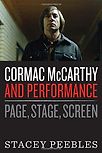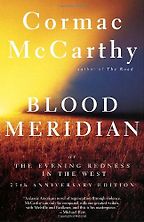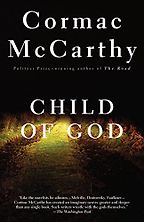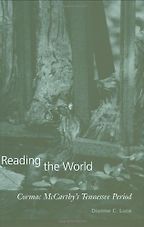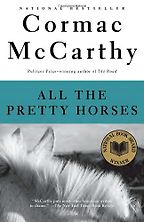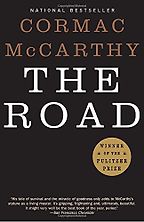Today* we are going to talk about Cormac McCarthy—a man said by many to be the greatest living American writer—and the best books on or by McCarthy. How would you characterise McCarthy’s work?
I think of him as an author that is very interested in region. He starts as a ‘Southern writer’; his first four books are really deep investigations and explorations of that area, particularly Tennessee. Then, he surprises everybody by picking up and moving west, and gets interested in the idea of the Western.
He writes and publishes Blood Meridian, which does not look like any kind of Western that most people have seen before. Yet it’s rich with history and dialogue and the mythology of region, even though he’s turning all of that to his own ends. He does the Border Trilogy, No Country for Old Men and then finally returns to the South with The Road—although that’s a very different kind of book. He’s deeply interested in what region means: as a place that inflects communities and individuals’ way of speaking, way of being in the world, way of understanding history, of understanding each other . . .
He was first recommended to me as an author by my Dad. I was in college. He had All the Pretty Horses in his hand and said: ‘You really ought to read this. He really gets dialogue.’ I’m originally from Texas, and at that point I didn’t know anything about McCarthy, but I read it and thought: this is just spot on, the way these characters talk to each other. Which is why it was so surprising later when I found out he was not from there. McCarthy was born in Rhode Island and moved to Tennessee when he was still quite young. But it never ceases to amaze me what a good ear he has for capturing that aspect of how people interact.
I don’t like him described solely as a ‘regional’ writer, because that’s often used as a diminishing term, as if this is a guy who is only interesting to people who are of that region. Which is certainly not the case with McCarthy. But he does have a compelling understanding of place and identity, and I like that a lot.
Could you tell us a little of his early years and the beginning of his career?
Well, he started writing when he was pretty young. The earliest stuff we have are a few little pieces that he published in his high school newspaper. He went to Knoxville Catholic High School. These pieces have not been republished, but he wrote some little poems which are largely about the natural world and going hunting and experiencing the region and nature that way. He wrote a little piece about going to a traveling fair that came through town, how he jumped the fence with a couple of friends because he didn’t have the money to pay.
There was also a short biography of him in that newspaper. It said he had tons of hobbies, so I think at that age writing was one of many things that he was interested in and liked to do. We don’t have a whole lot of information about his life, since he’s pretty reticent and there has been no official biography so far.
Then he spent some years at the University of Tennessee, where he published two short stories in their literary magazine The Phoenix. That seems to be where he started to get interested in the idea of being a writer. And it was a fairly long process: his first novel, The Orchard Keeper, came out in 1965, and there was a long process of working with two editors—first Lawrence Bensky and then Albert Erskine, at Random House—to make that novel what it needed to be and to get it into a defined shape. My friend and fellow scholar, Dianne Luce, has written a lot about his work with Albert Erskine, whom he worked with for all his Southern novels. If you look at the correspondence, you see how willing he was to listen to suggestions, to take guidance, but also to make a stand when he felt like a stand was needed.
By the mid 1960s, I think that his identity is as a full-fledged author.
Before he made his breakthrough commercially, Cormac McCarthy was seen as a writer’s writer. That seems to have been reflected in how many grants he received even from a very early stage.
Right. Of course the most famous award he received early on is the MacArthur Fellowship, which essentially allowed him to continue in the process of writing Blood Meridian. It was not until 2006 that he won a Pulitzer for The Road. But you’re right that 1992 was the big turning point in his career, since that’s when he published All the Pretty Horses and that was the first bestseller. He published five novels before that, but each one sold fewer than 5,000 copies. So he was kind of scraping by.
He said in one interview that he was living as minimally as possible—and then right when it was getting really difficult, maybe some other largesse would show up, some other grant that would keep him going for the next little bit. But everything changed with All the Pretty Horses. That’s when he became known, that’s when money was no longer an issue. It didn’t really change the way he writes, because he doesn’t do the talk show circuit; he doesn’t seek out fame or other monetary sources. He just became much more known. That’s when he goes from being this well-kept secret, in the literary world, to being someone much more popular.
As you touched upon there, McCarthy has a reputation for being enigmatic—even hermitic. Is that a fair portrayal?
That’s actually something I talk about in the book that I wrote about McCarthy: how he’s often characterised in that way. But he’s not a Salinger; he’s not a Pynchon. We know what he looks like; he has friends; he has a community. I mentioned Erskine earlier—he does have history of working with other people.
From the beginning, he just said, ‘I’m not interested in talking extensively about my writing.’ That said, he has given a small number of interviews. He gave some very early in his career: in 1992, the big, famous one is with Richard Woodward for The New York Times, and in it he was pretty forthcoming about a number of different topics. That was right as All the Pretty Horses was coming out. And he’s talked to Rolling Stone and he went on Oprah when The Road was published.
I don’t think it’s right to call him a hermit. I think he just likes his privacy. And he doesn’t want to tell you what to think about the books, which I’ve always loved as somebody who studies his work: I want to be free to interpret it as I wish. If you’ve studied somebody like Flannery O’Connor, it’s kind of tricky, because she’s offered statements like ‘here is what I was doing.’ If you want to counter that, you have to do a little tap dance around her authorial statements, which can be awkward. With McCarthy, there’s no need to do that—you can think what you want!
Great, let’s get to the books. Shall we start with Blood Meridian? This was published in 1985, and is arguably still his most iconic work. Set in the American-Mexican borderlands during the 19th century, it follows a lawless band of scalp hunters. Harold Bloom called it “the ultimate Western.”
For my money it is his opus, his great work. There is obviously debate about that, but for people who study McCarthy, it usually comes down to Blood Meridian, Suttree or The Crossing. These are probably the most difficult books, the most challenging books, the longest books. So I risk irritating some of my colleagues by going for Blood Meridian rather than Suttree, and I should acknowledge that they’re both great. But Blood Meridian is really the masterpiece; it’s just such a rich mixture of history and metaphysics.
“Blood Meridian is the masterpiece; a rich mixture of history and metaphysics”
Of course there’s interest in the region and engagement with the idea of the Western, but most people who have read it would say there’s no other Western like Blood Meridian. People have made some interesting comparisons to Sam Peckinpah’s films, but as a reading experience Blood Meridian is singular. It’s one of those books that, when you finish it for the first time, you think: ‘I’m not sure what to do with that.’ Harold Bloom said it took him, what, three attempts to actually finish it? You have to let it open up, come back to it, read it again, because there’s just so much there.
I was recently teaching David Foster Wallace’s Infinite Jest, which is this massive, thousand-page-plus book. David Foster Wallace was very interested in Cormac McCarthy. You can go to his archive and see his own copy of Blood Meridian that’s marked up all over the place. And I think those two books, as different in emphasis and style as they are, are rather similar. You finish each one and just think, ‘Oh, okay, I have to live with this, digest this for a while before I will really know what to do with it.’ I like that about a piece of literature. And that’s one of the reasons that this book in particular has kept being so interesting to me over the many years that I’ve taught it, studied it and written about it.
The New York Times pointed out that it “may be the bloodiest book since The Iliad.” Could we talk about the ultra-violence that so often features in McCarthy’s work?
Yes. The quote often mentioned is from that Woodward New York Times piece from 1992. McCarthy said: “There’s no such thing as life without bloodshed. I think the notion that the species can improved in some way, that everyone can live in harmony, is a really dangerous idea. Those who are afflicted with this notion are the first ones to give up their souls, their freedom. Your desire that it be that way will enslave you and make your life vacuous.”
Five Books interviews are expensive to produce. If you're enjoying this interview, please support us by donating a small amount.
So he seems to be someone who thinks you have to look at this stuff. If you’re going to try to capture the human condition in some way, shape, or form, then violence is something that you can’t ignore. Particularly as somebody interested in the American South and the American West—these areas certainly have a history of violence that you really have to grapple with.
That doesn’t mean there isn’t a counterbalance in his work; I think he’s also devoted to the idea of human connection and connection with the natural world. But he’s not going to give you that without first talking about conflict—and not just easily comprehensible conflict, the mythic gunfire shootout in the middle of the street at high noon. That’s much less messy and extreme and irrational than violence as it actually occurs.
So yes, his stuff is hard to read, and Blood Meridian is a very difficult text for that reason. At the same time, it’s not a gratuitous representation of violence. He does it for a reason, and he does it in a way that works.
Should we see Blood Meridian as the beginning of the cult of Cormac McCarthy? I mean—it was his first Western, right?
I think if you want to talk about Cormac McCarthy as an author of intense interest to a certain kind of person, it’s really got to start before that—with his strange little Southern novels and then with Suttree, which is a lot bigger, very funny, and a sort of love letter to Knoxville. People who are really interested in that stuff came to McCarthy pretty early.
In that case, let’s step backwards and look at Child of God, published in 1973. It’s about a violent man living outside society who becomes a serial killer and a necrophiliac. It was a very shocking book at the time it was published. It would still be a shocking book now. What was the response?
Well, there wasn’t much of one, simply because it didn’t sell a whole lot. There were good reviews which appreciated what McCarthy was after, but most conversation happened in retrospect, because after All the Pretty Horses came out, Vintage republished all of his earlier work, which had largely gone out of print.
But about the book generally: I love it. It’s an elegant little novel about decidedly inelegant subject matter. I’ve taught it a number of times and I just love how it opens up for the reader. It’s certainly not pyrotechnic or linguistically excessive in the way that both Blood Meridian and Suttree are, but there’s so much going on with it. The reader really has to negotiate her own reaction to the character as the character changes over the course of the book.
When I teach it, I often am very careful about how I break up their reading assignments. When students read the first third of it, they say, ‘You know, I really feel for this guy, he’s just trying to get by, his community is pushing him away, he’s doing the best he can with the resources he has.’ Even up to and including his first act of necrophilia—which is really a kind of spontaneous opportunistic act—they’re still sort of with him: ‘He was just so lonely. Is this a violation?’ You can guess the kind of interesting philosophical discussions they have about it: ‘Well, it’s a taboo, okay, but he’s not hurting anyone . . .’
But right after that, the students read the next section, where he turns to actual violence and murder, and they have to question everything they thought up until that point. Then there are interesting conversations right at the end of the book about how to feel about this character, and some gorgeous imagery all the way through.
It’s short. The challenge is not in its length, or in its density of language, or obscure references, or anything like that—all of which could be said about Blood Meridian, certainly. It’s really just about encountering this very finely-drawn character, and having to decide how to deal with him. Which I think is a beautiful reading experience, even as it is about such potentially disturbing material.
The book is based on some newspaper reports of a real-life figure in Sevier County, Tennessee. Do we know anything more about this case and how closely the book parallels it?
Here’s where I can make a pitch for another book, and that’s Dianne Luce’s book.
Okay, yes. This is Reading the World: Cormac McCarthy’s Tennessee Period, the only book not by McCarthy himself on your reading list.
By this point there has been an awful lot published on McCarthy, both in terms of articles and full books. As I mentioned, there’s no biography, but I was trying to think what would be the one thing I’d recommend to read about McCarthy, and Dianne rises to the top—this book in particular.
In it, she covers the Southern novels up through Suttree, and she unpacks all of this historical background. Like me, she’s very interested in McCarthy as a person who engages with region, and her chapter on Child of God is wonderful because she talks about the historical cases that McCarthy may have been drawing on in order to create this character.
One of them is Ed Gein, who was also the inspiration for Norman Bates in Psycho. You would never think to put Child of God together with the film Psycho, but they do share this common ancestor. Luce does a great job of looking at the different characterization of these two figures, Norman Bates and Lester Ballard: their motivations, the way that those motivations are explained or not explained. There are some sharp differences and some interesting commonalities, and she does very fine detail work in digging this stuff up.
She also puts it in the context of another killer from the region, James Blevins—who interestingly shares a surname with a character in All the Pretty Horses. So she puts that historical basis together, and then adds in a metaphysical understanding of Ballard as somebody who is stuck in Plato’s cave, if you will; he can’t emerge into enlightenment because he’s struggling down in the shadows. And it happens literally in the book: he enters a cave system near the end of the novel.
It’s just such a masterful reading. That is probably my favourite of the chapters in her book, although she does excellent work with all of the Southern novels.
Could you clarify which novels comprise Cormac McCarthy’s Southern period?
Typically, when we say that we mean The Orchard Keeper (which is his first), Outer Dark, Child of God and Suttree. Now, The Road was published in 2006—but it is post-apocalyptic, and its location is not obvious to the casual reader. It is set, at least in part, in the South, in Tennessee, although that’s rather veiled. He also has his scripts. His play The Stonemason is set in Louisville, Kentucky. His screenplay, The Gardener’s Son, is also set in Tennessee. Those are lesser known works, certainly less read, but part of that constellation. But when people usually say ‘the Southern novels’, they mean those first four.
You mentioned the Platonic cave image. Luce writes about how McCarthy integrates his literature with philosophy, specifically gnosticism and existentialist philosophy.
Yes. She does a great job of laying out the historical—explaining the Tennessee Valley Authority and why that matters, why that’s such a phantom presence in all of his Southern novels. But then she is using the text and the historical sources to author a metaphysical reading as well.
I’ve seen reviewers describe his work as “an allegory on the nature of evil.”
I don’t know if I would say that what he thinks his characters are confronting is evil. That’s a philosophically and theologically loaded term.
Huh. That’s interesting. We’re talking about scalp hunters and serial killers. Do you mean that McCarthy portrays them not as evil figures so much as complex humans who do evil?
I think sometimes attributing the term ‘evil’ to someone or something is an easy way out—it can subvert the need for investigation, for asking really tough questions. I mean, if you look at Blood Meridian and some of the really atrocious stuff that’s happening, these things are also politically motivated, right? So, parts of the Mexican government are paying the Glanton gang to scalp Native American tribes in the area, and so the Glanton gang is essentially functioning as a band of mercenaries—but they buy weapons from a Prussian working out of Santa Fe and seem to be partially funded by an American consul. And these are historically verifiable figures.
What some McCarthy scholars have been interested in more recently is his engagement with economics: how talking about ‘evil’ as simply a metaphysical category might be an easy way of not talking about some of the motivating factors for why this violence was occurring. Or look at Child of God. One of the big conversations around that book is how the community can be seen as driving Lester to do this. They repossess his farm; they reject him socially, they keep pushing him away and away and away. The guy just wants to have some space for himself and he literally is denied any kind of human community or resource. This is his reaction. To call it ‘evil’ is too simple.
“Oprah asked McCarthy if he believes in God, and he said: ‘It depends which day you ask me’”
You might be able to use the term about particular characters in McCarthy, most notably Judge Holden in Blood Meridian and Chigurh in No Country for Old Men, specifically because their motivations are less clear. Chigurh is not killing for money, he says so, and Judge Holden doesn’t seem to be either. They don’t seem to be satisfying perverse desires. In Judge Holden’s case, it’s not clear how (or if) his perversity is linked to his murderousness.
Maybe McCarthy engages evil as what we call it when we don’t have a clear choice of explanatory factors. But the idea of evil as straightforward, ‘there are beings in the world that are black holes’, I don’t know, to me that sounds a little too easy.
Cormac McCarthy’s writing is often described either as ‘biblical’ or in relation to the tone of the King James Bible. Has McCarthy gone on record with his politics or religious beliefs?
Oprah asked him that. She was pretty good at asking him straight questions. Oprah asked him if he believes in God, and he said: “It depends which day you ask me.” This was about The Road, which of all of his novels is probably the most religiously inflected. Certainly the father in that book thinks about God and wonders about God, in some pretty specific terms. And so in that Oprah interview, when they were talking about The Road, he did say that “I don’t think you have to have a great idea of who or what God is in order to pray.” Which I thought was a nice way to put it.
I wondered if you could say a little bit about his literary influences?
Oh, those are extensive. Let’s see. Michael Crews has recently published a book about McCarthy called Books Are Made Out of Books, which is a quote from the Woodward interview. Crews went through McCarthy’s archives and wrote about all of the different authors that he seems to be alluding to, or mentions explicitly in his correspondence, in his notes for a manuscript.
Five Books interviews are expensive to produce. If you're enjoying this interview, please support us by donating a small amount.
So the short answer is there’s a whole book-length list of those. But the big ones are Faulkner, both in style and substance, and Hemingway in some of the subject matter and also style. Steven Frye would say you have to talk about Dostoevsky, you have to talk about Herman Mellvile, you have to talk about these capital-R ‘Romantic’ authors. Plato, right, his philosophical works. It seems that for most of McCarthy’s life he’s been a voracious reader and consumer of ideas. So, those would be the big names, but there’s certainly a lot of others.
Thank you. Let’s move on to All the Pretty Horses. As we said earlier, this was the breakthrough book. It was a publishing sensation.
Yes. It came out in 1992 and was an immediate bestseller. There was a bidding war over the film rights, though a film didn’t get made for some years—that’s a whole other story.
Like Blood Meridian, All the Pretty Horses is a Western. It is violent, but it has the appearance of being more traditional, more romantic. It’s got a very appealing protagonist, the 16-year-old boy John Grady Cole, who is dissatisfied with his life in Texas and decides to make a clean break and ride to Mexico with his best friend. So it’s an adventure tale.
Readers really respond to it. It is a nice balance of accessible and challenging. The plot is pretty accessible—again, it doesn’t have either the density or the hyper-violence of Blood Meridian—but the language is gorgeous. Starting from the first page, it’s got sentences that will just stop you cold, which is why I responded to it so much when I first read it. And yet his virtuosic style is not an impediment to the book, and that’s one of the reasons why it teaches really well, and one of the reasons that a lot of people like it so much.
That said, it’s also a book that is not as traditional or romantic as it initially seems. I read it quite differently now to how I did when I first read it. So people can get pretty different idea out of it, depending on what kind of context you’re coming from.
As you mentioned, it has the shape of a real Boy’s Own adventure, and Cormac McCarthy’s work is very concerned with masculinity. I mean, both you and I are female and love his work—but could you address that question of maleness, and how important it is to McCarthy?
I’m not sure that he would put it that way. Certainly not writing in the 1960s. But I think this idea of what does it mean to be a man, what does it mean to have a sense of masculine identity, is there in every book that he writes. But I would be one of the critics who would say he’s critiquing that.
John Grady Cole in All the Pretty Horses is almost astonishingly skilful, very appealing, quite sympathetic, but by the end, he doesn’t end up where he thought he would. And I don’t think he ends up where the reader expects him to be either. Especially if you’re expecting it to be a more kind of traditional story. And I have always loved the figure of Alejandra in that book, the girl that he meets down in Mexico and falls in love with, and romances. Do you mind spoilers?
No. All of these books have been out for a long time. Feel free to mention what you wish.
Well, in the end she says, ‘Sorry, I can’t be with you. I’ve got my reasons, and they’re important to me.’ He doesn’t get it, although he probably could’ve seen it coming. In fact, her grand-aunt, the Dueña Alfonsa, basically tells him this for pages and pages in this elaborate meeting they have. He still doesn’t really get it. And he doesn’t understand why his mother would want to move to San Antonio to be an actress. He just doesn’t get women, really.
And he continues not to get them, later in the Border Trilogy, and I find that kind of refreshing. McCarthy’s not overtly telling you that he’s thick in this fashion, but he is a character that gets confronted with his ideas about how the world should work. You can see that as tragedy, but you can also see that as a fairly sharp critique of what happens when you have those ideas in the first place.
Yes, it’s interesting that John Grady has such a lack of understanding of female characters, when he has an intuitive capability when it comes to handling horses. So this is an authorial decision.
Right. A woman is not a horse, it turns out.
Let’s move on to the final book, The Road, which we touched upon earlier. This is the 2006 Pulitzer Prize-winning, post-apocalyptic novel, made into a Hollywood movie in 2009. And there’s no getting around it: it’s bleak. Why should readers put themselves through reading it?
See, in another sense, I think The Road is probably McCarthy’s happiest book. Which is a little weird to say, but it does have the most sincere and overt love relationship of all of his works, between the father and the son. It’s very purely represented. It’s a relationship that is not without its complications, but beginning, middle and end, you can’t doubt the importance of that love and the sustained power of it, and its priority both for the characters and the premise of the book as a whole.
“I think The Road is probably McCarthy’s happiest book”
So it is a book that is very bleak, but if you’re always looking in McCarthy’s work at this dynamic between human violence—or even the violence of the natural world and what is balanced against that, which is community—The Road, to me, tips pretty heavily in favour of community, even as the violence is so pervasive and disturbing. And I think that’s why people responded to it.
2006 was really the other turning point in McCarthy’s career. Before, he was a well-known author and a best-selling author. But when The Road came out, I think he became beloved in a way that he hadn’t been before. When you’re on Oprah, it’s a sign, right? And I think partly it was because of the way he depicted that relationship.
You’ve mentioned the natural world a few times. In The Road, we don’t know exactly the nature of the apocalyptic event that has blighted the earth. But should we read it as environmental literature?
Some would say so, yes. I should preface that by saying this book has now surpassed Blood Meridian as being the book that has drawn the most scholarship. That’s kind of remarkable. Of all of McCarthy’s work, this one has the most stuff written about it. And it’s been written about in just about every way you can imagine. We mentioned theology or morality; it’s been written about in terms of economics. Is this the end of capitalism? Everybody just consumes one another right at the end. Is it about masculinity without social context, and what that means?
But a lot of people have said we should see it as environmental literature. Eco-critics see it as a warning of what it would be like to lose the natural world. I think that’s pretty potent.
Another thing McCarthy said to Oprah was: we ought to be grateful. It’s hard to read this book and not then look up from the page and feel some relief at colour and warmth, and trees, and life bubbling around you. In that sense, as a way of reminding you that those things can be lost, and the loss would be profound in ways that you can’t really imagine perhaps without art like this, then certainly we should read it as environmental literature.
Fantastic. And finally, does McCarthy have a book in the pipeline, that we know of?
We do. His most recent work is actually an essay. It was his first published non-fiction in 2017 in the science magazine Nautilus. It’s called “The Kekulé Problem.” It’s about consciousness and language, and is a fascinating read.
What we’ve been hearing for 20 years is that he’s been working on a very big novel that we think is called The Passenger. It’s funny: I think in the very first issue of The Cormac McCarthy Journal, back in 2001, the then-editor mentioned that it might be about to come out in her editorial introduction. And it’s still not out. So who knows. I have not heard of any publication date, although every once in a while there will be a rumour that it will come out next season . . . and then it doesn’t.
But you know, that science essay just dropped all of a sudden. He did the same thing with The Road and with No Country for Old Men. They just popped out, and nobody knew they were coming. That’s one of the fun things about studying a still-living author: you never know what kind of surprises you’ll get. But we do know that there will at least be one more book to come.
* Editor’s note: this interview was published on 23 September, 2019. The introduction was updated on June 13th, 2023.
Interview by Cal Flyn, Deputy Editor
September 23, 2019
Five Books aims to keep its book recommendations and interviews up to date. If you are the interviewee and would like to update your choice of books (or even just what you say about them) please email us at [email protected]

